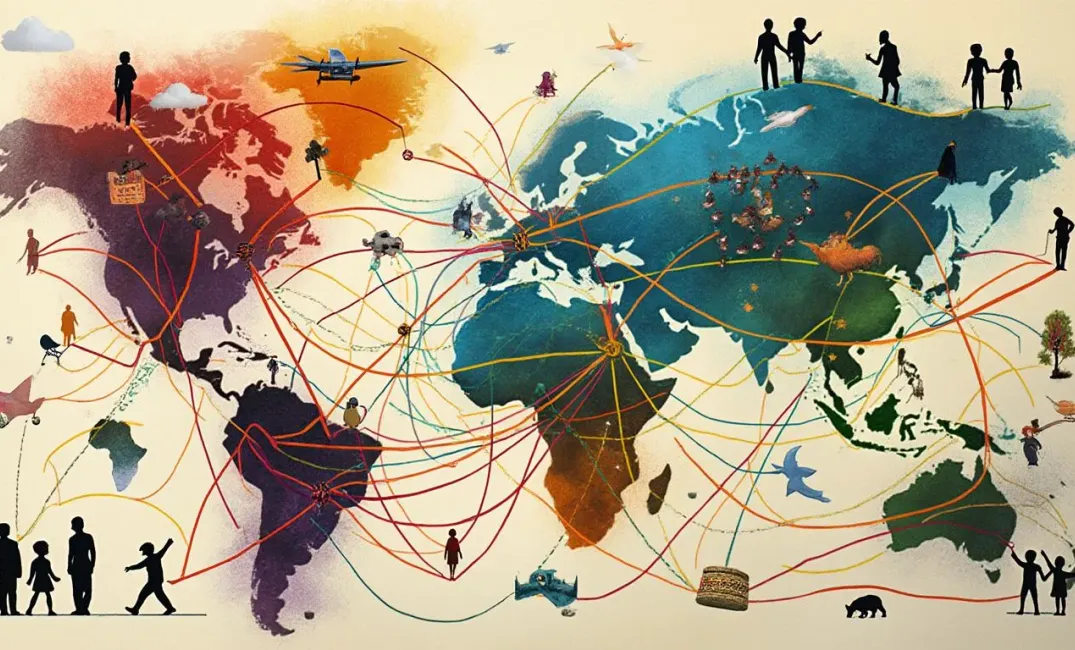Introduction: The Movement That Shaped Humanity
"We journey not to escape life, but for life not to escape us." — Anonymous
Human migration, a pivotal force in shaping societies, cultures, and civilizations, is a narrative as old as humanity itself. As people traversed lands and seas, their movement sowed seeds of transformation, connectivity, and adaptation—leading to the vibrant tapestry of human existence seen today. Migration is not merely a succession of departures and arrivals; it is infused with hope, curiosity, survival, and a quest for a better future.
This exploration delves into the profound legacy and continuous impact of human migration, tracing its historical pathways, underlying causes, and enduring consequences. It uncovers how migration weaves into the very fabric of our identity, relentlessly influencing our future on this vessel and beyond.
The Genesis of Migration: Footprints Through Time
The Dawn of Human Migration
- Out of Africa Theory: Approximately 70,000 years ago, Homo sapiens began their exodus from Africa. These initial migrations are pivotal, marking humanity's mass geographical dispersal that seeded available territories, adapting and evolving genetic diversity.
- Crossing Continents and Climates: Early humans traversed harsh terrains, including deserts and ice sheets, featuring remarkable adaptability. The crossing into Asia, Australia, Europe, and the eventual land bridge to the Americas highlights the audacity and persistence imbued in human migration.
Ancient Civilizations and Trade Routes
- Silk Road's Influence: The Silk Road epitomizes early trade-motivated migration, linking East Asia to the Mediterranean. Through traders, explorers, and soldiers, cultural exchanges flourished, shaping linguistic, culinary, and religious facets of various societies.
- Mediterranean Crossroads: The Mediterranean region, a vibrant convergence of Europe, Asia, and Africa, saw flourishing empires and migratory exchanges. The spread of Greek and Roman cultures underscores migration's role in laying foundations for Western civilizations.
Catalysts of Migration: Driven by Necessity and Opportunity
Push and Pull Factors
- Environmental Changes: Throughout history, climate changes and natural disasters compelled migrations. As ancient Sahara Lake levels dropped, tribes sought fertile lands, reminiscent of modern migrations driven by environmental crises.
- Economic Aspirations: Economic motivations, such as better livelihoods, have long propelled migration. The allure of the New World epitomized opportunity, inspiring waves of settlers seeking prosperity amidst uncertainty.
Conflict and Displacement
- Conquest and Empire Building: Historical conquests, from Alexander the Great to the Mongol Empire, entailed forced migrations and resettlements, shaping demographic and territorial landscapes.
- Wars and Refugee Movements: Wars generate refugee flows, exemplified by World War I and II displacements. Recent conflicts in regions like Syria underline migration's ongoing role in human survival against adversities.
The Modern Migration Narrative: Diversity Underpinning Society
A Globalized World
- Diasporas and Cultural Enrichment: Migratory diasporas, such as the Indian and Jewish communities, bolster cultural diversity, enhancing host societies with traditions, cuisines, and cross-cultural dialogues.
- Economic Integration and Innovation: Migration fosters economic dynamism and innovation. Migrants contribute through entrepreneurship, filling critical labor gaps, and infusing fresh perspectives in industries and academia.
Challenges and Resilience
- Integration and Identity: The intricacies of cultural assimilation spotlight the challenges migrants face—balancing tradition with acculturation, underscoring blended identities' contributions to societal cohesion.
- Policy and Ethical Considerations: Migration policy is a contentious discourse, requiring ethical foresight and compassion to navigate national interests and human rights, acknowledging migrants' dignity and contributions.
The Future of Human Migration: Navigating Complexity
Environmental Migration and Climate Refugees
- Climate-Driven Movements: Projected climate impacts can alter migration patterns, potentially creating climate refugees—an urgent call for international cooperation to address human and environmental sustainability.
- Adaptation and Mitigation: Innovation in agriculture, urban planning, and technological advancements offers pathways to adapt to changing environmental challenges, mitigating forced migration pressures and fostering resilience.
Space Migration: Humanity's New Frontier
- Colonizing New Worlds: As humanity stands on the threshold of space, envisioning settlements on celestial bodies prompts new migratory narratives—combating terrestrial constraints while exploring cosmic possibilities.
- Ethics of Extraterrestrial Migration: Space migration's implications demand ethical consideration to balance exploration with planetary stewardship, ensuring equitable access and fostering shared aspirations beyond Earth.
Conclusion: The Enduring Legacy of Human Migration
"Migration is not just a journey; it's the art of becoming oneself." — Pico Iyer
Migration, an enduring and defining aspect of human existence, is a perpetual movement reflecting resilience, curiosity, and tenacity. It molds societies by uniting disparate cultures, fostering innovation, and shaping collective futures. As we continue this journey—both terrestrial and cosmic—embracing the lessons of past migrations equips us to navigate anticipated challenges with empathy and conscientiousness.
In celebrating the diverse narratives migration weaves into humanity's legacy, we reaffirm our shared aspiration for a harmonious future where movement enhances collective experience, innovation, and understanding. Through these ever-evolving journeys, we realize migration's central role in the epic story of humanity's enduring quest for connection, identity, and belonging.
CULTURE, HUMAN MIGRATION, ADAPTATION, MOVEMENT, CLIMATE CHANGE, SOCIETY, POLICY, DIVERSITY, FUTURE, HISTORY

